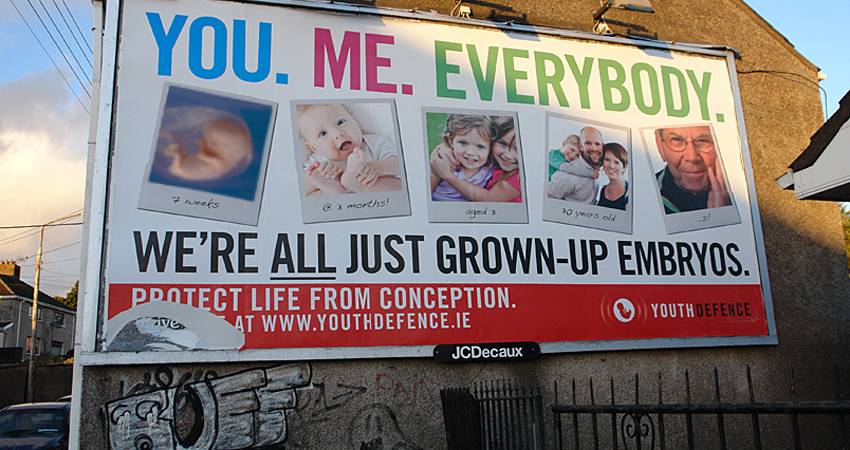
The European Court on Human Rights to rule on the status of the human embryo
The European Court on Human Rights to rule on the status of the human embryo In the next months, the European Court on Human Rights (ECtHR) will have to rule on the matter of the status of the human embryo in a case which bears some similarities to the RvR case in Ireland.
According to the European Centre of Law and Justice (ECLJ) , the case of Adelina PARRILLO versus Italy (no 46470/11) concerns a woman who in 2002, at the age of 48, decided together with her husband to have children by means of medically assisted procreation (MAP).
Five human embryos were created for this purpose and frozen for future implantation, as the applicant was suffering from endometriosis. In 2003, the applicant lost her husband and gave up the pursuit of the implantation of the embryos.

One of the very popular You. Me. Everybody billboards that were shown nationwide by Youth Defence which states that "we are all grown up embryos"!
Eight years later, in 2011, dissatisfied that Article 13 of the Italian Act 40/2004 (Act 40) forbids the destruction of human embryos (including through scientific research), the applicant applied directly to the ECtHR, without exhaustion of national remedies.
She alleges that her “property rights” over the five frozen embryos (Article 1 of Protocol No. 1) and her right to private life (Article 8) have been breached by this law because it prohibited her from giving the embryos for destruction through scientific research “obliging her to keep them in a state of cryopreservation until they were no longer viable”.
The ECLJ has been authorised to submit an amicus brief in the case, and it has pointed out that alleging a right of “property” over the embryos implies that they are mere goods, and not persons or subjects of law. In its memorandum, the ECLJ recalls that Act 40 was adopted to set ethical standards and the recognition of the rights of the embryo under the Act has affected the economic sectors of MAP and biotechnology and has caused an ethical debate.
The ECLJ sets out that Act 40 recognises the human embryo in vitro as a subject of law, in the same way as the other subjects involved in MAP and aims to guarantee its right to life.
To this end, it forbids the deliberate destruction of conceived embryos (destruction by preimplantation genetic diagnosis (PGD) or by scientific research) and prescribes the freezing of embryos which have not (yet) been implanted.
The choice of the Italian legislature is supported by numerous European norms. The ECLJ recalled that the European Court leaves to each State the responsibility to determine when the protection of the right to life begins, and grants the protection of the Convention to the embryo or the foetus from the moment domestic law grants this protection. Therefore, the Convention applies to in vitro embryos which benefit from the protection of the measures of Italian law.
Given that embryos are subjects, they cannot be things or objects of a right in rem, and cannot be deliberately destroyed. Abortion allows the destruction of embryos in utero in order to protect the right to life and health of the mother. The destruction of embryos in vitro is not necessary to protect a comparable, concurrent right, such as the right to life of the mother. The legal principle of the primacy of the human being clearly contradicts the justification of the destruction of embryos in vitro in the interest of science.
The fact that some European States allow destructive embryonic research is not conclusive because this does not resolve the preliminary question of the nature and the protection of the embryo as a matter of domestic law. Thus, the existence of a quasi-consensus does not create a conventional obligation to legalise such a practice.
Therefore, from the moment when the Italian legislature agreed to recognise the embryo in vitro as a subject and the principle of primacy of the human being is applicable, it became impossible to grant the applicant’s requests.
The European Centre for Law and Justice is an international, Non-Governmental Organization dedicated to the promotion and protection of human rights in Europe and worldwide. The ECLJ holds special Consultative Status before the United Nations/ECOSOC since 2007.)
Featured
- How campaigners dropped the ‘fatal’ from ‘fatal foetal abnormalities’ in push for abortion
- RTÉ Investigates turns a blind eye to 38,000 babies aborted and other grim realities
- After Limerick case, medics write to every TD to warn ultrasounds must be provided before abortion
- Irish MEPs join EU lawmakers in voting to enshrine abortion as a fundamental right
- Every TD and Senator contacted re Limerick abortion scandal
- Stop the Cover-Up or Women Will Die
- Horror in Prague: A hospital aborted the baby of the wrong mother
- Why are the media ignoring the abortion scandal that almost killed a woman?
- Limerick: woman who was prescribed abortion pills had life-threatening ectopic pregnancy
- Rally for Life 2024
- Exposing the Numbers
- Alive and Kicking: Your baby before 12 weeks
You can make a difference.
DONATE TODAY